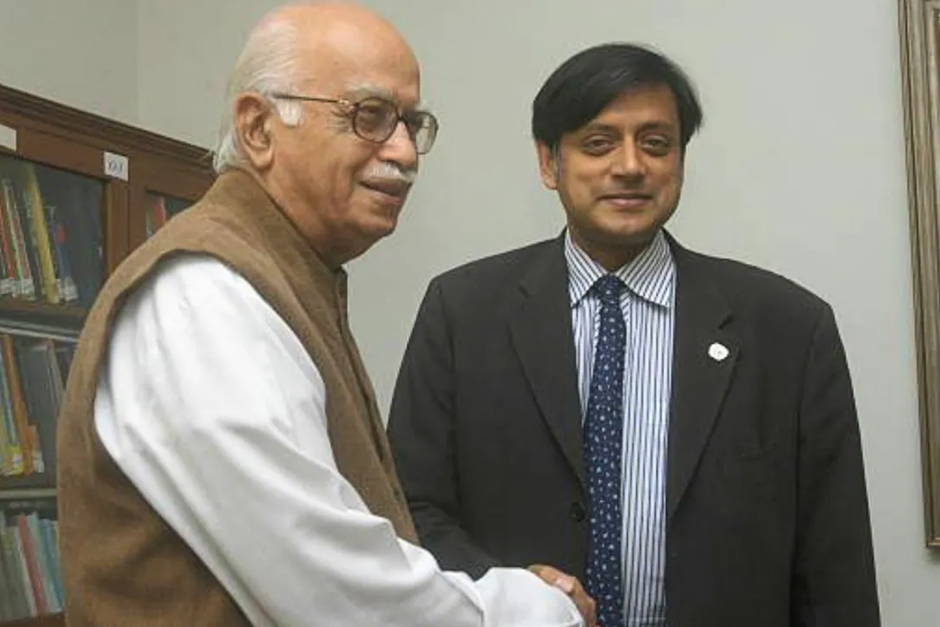In the vibrant, often contentious, landscape of Indian politics, a recent social media post by senior Congress leader Shashi Tharoor has once again ignited discussion, not just across the political spectrum but significantly within his own party. Tharoor’s message, commending veteran BJP figure L.K. Advani on being conferred the Bharat Ratna, India’s highest civilian honour, triggered a swift and firm rebuttal from the Congress party, underscoring the delicate balance between personal courtesies and entrenched ideological differences.
The incident unfolded against the backdrop of the government’s announcement to honour L.K. Advani, a towering figure in the Bharatiya Janata Party and a key architect of its rise to prominence. While many across the political divide acknowledged Advani’s long career and contributions, Tharoor’s specific encomium from within the Congress ranks brought long-standing ideological tensions to the fore.
A Nuanced Compliment Sparks Internal Fissures
Shashi Tharoor, known for his articulate expression and often nuanced positions, took to social media to congratulate L.K. Advani. His post typically lauded Advani’s significant contributions to Indian politics, his long and dedicated public service, and perhaps, his statesmanship in certain contexts. Tharoor’s message, while acknowledging political differences, aimed to convey a sense of respect for a veteran leader receiving the nation’s highest honour. This approach is consistent with Tharoor’s often-expressed view that respect for individuals, even across the political aisle, can coexist with ideological opposition.
However, for a party like the Congress, which has historically positioned itself as a bulwark against the BJP’s Hindutva ideology, such a public commendation of L.K. Advani carries significant weight. Advani’s political career, particularly his role in the Ram Janmabhoomi movement and the Rath Yatra that preceded the demolition of the Babri Masjid, is deeply intertwined with moments of intense communal polarisation in India. For the Congress, these events represent a fundamental challenge to its foundational principles of secularism and pluralism. Tharoor’s post, therefore, was perceived by many within his party as potentially softening their stance on a figure whose political legacy is ideologically antithetical to theirs.
Congress Reasserts Its Ideological Stance
The Congress party’s response was swift and unambiguous. While senior leaders refrained from directly admonishing Tharoor publicly, the party spokesperson issued a statement that clearly distanced the party from any implication of endorsing Advani’s political past. Without naming Tharoor, the rebuttal highlighted the party’s unwavering commitment to its core values and reminded the public of Advani’s controversial role in specific historical events.
A Congress spokesperson, speaking to reporters in New Delhi, reportedly stated, “While we understand the spirit of personal courtesy, the Congress party’s ideological position on Mr. Advani’s political journey, particularly concerning the Ayodhya movement and its aftermath, remains firm. Our commitment to secularism, pluralism, and the constitutional fabric of India is non-negotiable. We cannot forget the divisive chapters of our history which were antithetical to the principles of Mahatma Gandhi and Jawaharlal Nehru.” This quote encapsulates the party’s stance, drawing a clear line between individual expressions of goodwill and the collective ideological posture of the Congress.
The rebuttal served multiple purposes: it reaffirmed the party’s foundational principles, sent a message of internal discipline, and perhaps most importantly, aimed to prevent any perception that the Congress was diluting its long-held criticisms of Advani’s politics. In an election year, maintaining a clear ideological narrative is paramount for any major political party.
Navigating Internal Dialogue and Public Messaging
This episode is not an isolated one in the history of the Congress party or, indeed, in Indian politics. Leaders frequently find themselves navigating the complexities of personal relationships, respectful discourse, and party lines. For Shashi Tharoor, who often articulates views that sometimes stand apart from the party’s official narrative, this incident once again highlighted the challenges of balancing individual expression with party discipline. While Tharoor’s supporters often laud his independent thinking, critics within the party sometimes view such overtures to political opponents as undermining the party’s resolve.
The incident also sheds light on the broader struggle within political parties to control their narrative in the age of instant communication. Social media posts, once a tool for personal expression, are now scrutinized as official statements, often requiring swift clarification or rebuttal from the party machinery. For the Congress, this particular episode underscores the ongoing challenge of uniting diverse voices under a single, coherent ideological banner, especially when confronting the legacies of figures who have defined India’s political fault lines.
Ultimately, the Shashi Tharoor-L.K. Advani post and the subsequent Congress rebuttal serve as a potent reminder of the intricate dance between personal respect, ideological conviction, and party discipline in the dynamic theatre of Indian politics. It reinforces the idea that while individual gestures of goodwill might be welcomed, they must always be weighed against the historical context and the unwavering principles that define a political party’s identity.




